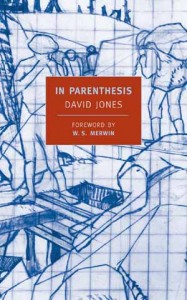Random
Front Matter/Back Matter
 From TS Eliot’s Introduction to In Parenthesis by David Jones:
From TS Eliot’s Introduction to In Parenthesis by David Jones:
A work of literary art which uses the language in a new way or for a new purpose, does not call for many words from the introducer. All that one can say amounts only to pointing towards the book, and affirming its importance and permanence as a work of art. The aim of the introducer should be to arouse the curiosity of a possible new reader. To attempt to explain, in such a note as this, is futile. Here is a book about the experiences of one soldier in the War of 1914-18. It is also a book about War, and about many other things also, such as Roman Britain, the Arthurian Legend, and divers matters which are given association by the mind of the writer. And as for the writer himself, he is a Londoner of Welsh and English descent. He is decidedly a Briton. He is also a Roman Catholic, and he is a painter who has painted some beautiful pictures and designed some beautiful lettering. All these facts about him are important. Some of them appear in his own Preface to this book; some the reader may discover in the course of reading.
How important is the front matter and back matter of a book to you? Do you read introductions by translators and others before you read a book? Or after you’ve read the book? Do you care much about what another person writes in an afterword? Has the name of an introducer ever helped you to purchase a book? What are some introductions/prefaces/afterwords that particularly stand out in your mind as interesting?

I love packages. I love parcels wrapped in paper and tied with twine. I love to shake the box and speculate about what’s inside. Ultimately, the wrapping paper is discarded and what’s inside is all that I retain both physically and emotionally/in memory. But that anticipatory pleasure, the shiny paper with the T.S. Eliot tinsel, ….
The Leon Wieseltier preface and Hannah Arendt introduction to Illuminations by Walter Benjamin are the best kind of glittery wrapping paper, and, to put the lie to what I said above, not at all discardable.
I love packages. I love parcels wrapped in paper and tied with twine. I love to shake the box and speculate about what’s inside. Ultimately, the wrapping paper is discarded and what’s inside is all that I retain both physically and emotionally/in memory. But that anticipatory pleasure, the shiny paper with the T.S. Eliot tinsel, ….
The Leon Wieseltier preface and Hannah Arendt introduction to Illuminations by Walter Benjamin are the best kind of glittery wrapping paper, and, to put the lie to what I said above, not at all discardable.
I don’t know how important it is or isn’t, but T.S. Eliot’s introduction just made me order this book.
I don’t know how important it is or isn’t, but T.S. Eliot’s introduction just made me order this book.
kyle, its a really great book. ihope you like it.
kyle, its a really great book. ihope you like it.
Walker Percy’s introduction to “Confederacy of Dunces”
Walker Percy’s introduction to “Confederacy of Dunces”
I love front and back matter. Often times, I find they really help to flesh apart really dense academic texts. One of the best front matters I’ve recently read was Stefan Collini’s introduction to C.P. Snow’s The Two Cultures. It was amazing.
I love front and back matter. Often times, I find they really help to flesh apart really dense academic texts. One of the best front matters I’ve recently read was Stefan Collini’s introduction to C.P. Snow’s The Two Cultures. It was amazing.
Me, too!
Me, too!
and i didnt quote from merwins intro to the new edition. his its pretty good too.
it begins:
In 1938, after In Parenthesis was first published, WB Yeats appeared at a literary tea in London, looked around the room until he sighted David Jones, and then bowed from the waist, saying, “I salute the author of In Parenthesis.”
and i didnt quote from merwins intro to the new edition. his its pretty good too.
it begins:
In 1938, after In Parenthesis was first published, WB Yeats appeared at a literary tea in London, looked around the room until he sighted David Jones, and then bowed from the waist, saying, “I salute the author of In Parenthesis.”
Send me my books you fuck
Send me my books you fuck
Ian Frazier’s “essay about writing essays” intro to “The Best American Essays of 1997” because it is engaging and smart, models the practice, and is a nice start to a good collection. It has “stuck with me” simply due to its charm.
And Brenda Maddox on “Dubliners”.
Ian Frazier’s “essay about writing essays” intro to “The Best American Essays of 1997” because it is engaging and smart, models the practice, and is a nice start to a good collection. It has “stuck with me” simply due to its charm.
And Brenda Maddox on “Dubliners”.
William S. Burroughs’ introduction to Jack Black’s _You Can’t Win_.
William S. Burroughs’ introduction to Jack Black’s _You Can’t Win_.